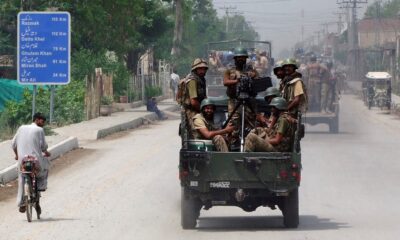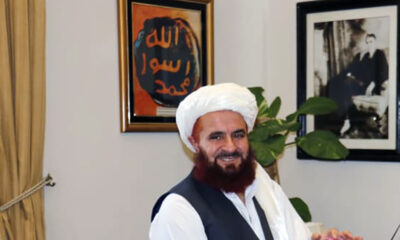Latest News
Trump signs order lifting sanctions on Syria, White House says
Some in Congress are pushing for the measures to be totally repealed, while Europe has announced the end of its economic sanctions regime.

President Donald Trump signed on Monday an executive order terminating a U.S. sanctions program on Syria, allowing an end to the country’s isolation from the international financial system and building on Washington’s pledge to help it rebuild after a devastating civil war, Reuters.
The move will allow the U.S. to maintain sanctions on Syria’s ousted former president Bashar al-Assad, his associates, human rights abusers, drug traffickers, people linked to chemical weapons activities, the Islamic State and ISIS affiliates and proxies for Iran, White House spokeswoman Karoline Leavitt told reporters in a briefing.
Assad was toppled in December in a lightning offensive by Islamist-led rebels and Syria has since taken steps to re-establish international ties.
Syrian Foreign Minister Asaad al-Shibani said Trump’s termination of the Syria sanctions program would “open door of long-awaited reconstruction and development,” according to a post by the foreign minister on social media platform X.
He said the move would “lift the obstacle” against economic recovery and open the country to the international community.
Syria’s President Ahmed al-Sharaa and Trump met in Riyadh in May where, in a major policy shift, Trump unexpectedly announced he would lift U.S. sanctions on Syria, prompting Washington to significantly ease its measures.
Some in Congress are pushing for the measures to be totally repealed, while Europe has announced the end of its economic sanctions regime.
“Syria needs to be given a chance, and that’s what’s happened,” U.S. Special Envoy for Syria Thomas Barrack told reporters in a briefing call. He described Monday’s move as “the culmination of a very tedious, detailed, excruciating process of, how do you unwrap these sanctions.”
The White House in a fact sheet said the order directs the Secretary of State to review the terrorism designations of Hayat Tahrir al-Sham, a rebel group that Sharaa led that has roots in al Qaeda, as well as Syria’s designation as a state sponsor of terrorism, read the report.
The White House said the administration would continue to monitor Syria’s progress on key priorities including “taking concrete steps toward normalizing ties with Israel, addressing foreign terrorists, deporting Palestinian terrorists and banning Palestinian terrorist groups.”
A Reuters investigation published on Monday revealed the role of Syrian government forces in the killing of more than 1,500 Syrian Alawites over three days of massacres along the country’s Mediterranean coast in March. The Trump administration had no comment on the Reuters report.
It was not immediately clear if Washington was lifting the sanctions on any of the factions that Reuters found were involved.
Syrians hope the easing of sanctions will clear the way for greater engagement by humanitarian organizations working in the country, encouraging foreign investment and trade as it rebuilds.
In the aftermath of Trump’s announcement in May, the U.S. Treasury Department issued a general license that authorized transactions involving the interim Syrian government as well as the central bank and state-owned enterprises, Reuters reported.
However, the U.S. has imposed layers of sanctions against Syria, some of which are authorized by legislation, including the Caesar Act. Repealing the measures is necessary for Syria to attract long-term investment without parties fearing the risk of violating U.S. sanctions.
“We are now, pursuant to the executive order, going to look at suspension criteria for the Caesar Act,” a senior administration official said.
Most of the U.S. sanctions on Syria were imposed on Assad’s government and key individuals in 2011 after civil war erupted in the country.
The dismantling of the U.S. sanctions program on Syria includes terminating from Tuesday a national emergency declared in 2004 and revoking linked executive orders, according to the order signed on Monday.
The executive order also directs additional actions, including some with respect to waivers of export controls and other restrictions, the order read.
Latest News
Artifacts of Afghanistan’s national museum are the soul of a nation, says UN official
The National Museum, founded in 1919, is widely regarded as one of the country’s most treasured cultural institutions.

In a symbolic and inspiring visit, Indrika Ratwatte, Deputy Special Representative of the United Nations Assistance Mission in Afghanistan (UNAMA) and UN Humanitarian Coordinator, toured the National Museum of Afghanistan on Tuesday.
The National Museum, founded in 1919, is widely regarded as one of the country’s most treasured cultural institutions.
Housing a vast collection of artifacts, the museum reflects thousands of years of Afghanistan’s rich and complex history—from prehistoric times to the Islamic period.
During the visit, Ratwatte remarked: “This collection is a testament to the enduring power of art—even amid war, exile, and destruction. These objects are not merely items on display; they embody the soul of a nation passed from one generation to the next.”
Despite suffering significant damage and looting during decades of conflict, the museum has undergone extensive restoration. Today, it plays a vital role in preserving and promoting Afghanistan’s national identity and cultural heritage.
Among its notable artifacts are Greco-Bactrian coins, Buddhist statues, Islamic manuscripts, and magnificent examples of traditional Afghan handicrafts—all echoing the resilience and artistic spirit of the Afghan people.
The visit, organized by UNAMA, underscores the United Nations’ broader efforts to support cultural preservation in Afghanistan and highlights the international community’s commitment to safeguarding the country’s unique heritage.
Latest News
OIC special envoy meets Qatari counterpart to discuss developments in Afghanistan
Tarig commended Qatar for its sustained diplomatic efforts and its constructive role in promoting peace, dialogue, and stability in the country.

Ambassador Tarig Ali Bakheet, Special Envoy of the Secretary-General of the Organization of Islamic Cooperation (OIC) for Afghanistan, met on Tuesday with Ambassador Faisal bin Abdullah Al Hanzab, Special Envoy of the Qatari Foreign Minister, to discuss the latest developments in Afghanistan.
The meeting took place on the sidelines of the UN-led Working Group meetings on Afghanistan, held in Doha on June 30 and July 1, and graciously hosted by the State of Qatar.
During the discussion, both envoys exchanged views on the evolving political, humanitarian, and security landscape in Afghanistan.
Tarig commended Qatar for its sustained diplomatic efforts and its constructive role in promoting peace, dialogue, and stability in the country.
He also delivered a comprehensive briefing on the OIC’s ongoing initiatives to support the Afghan people, particularly through the organization’s office in Kabul. These efforts, he noted, are being carried out in accordance with resolutions adopted by the OIC Council of Foreign Ministers.
The engagement underscores the growing coordination between regional and international partners aimed at addressing the multifaceted challenges facing Afghanistan and advancing inclusive solutions to support its long-term recovery.
Latest News
Afghanistan’s new ambassador to Moscow assumes position
An official at the Afghan Embassy in Moscow confirmed his arrival to AFP, stating that Hassan “was due to arrive today.”

A senior diplomat appointed by the Islamic Emirate of Afghanistan (IEA) formally assumed his role as Afghanistan’s ambassador to Russia on Tuesday, marking the first time an IEA-designated envoy has occupied the post in Moscow since regaining power in Afghanistan in 2021.
Russian state media reported that Gul Hassan, a former Afghan consul in Pakistan, arrived in the Russian capital earlier in the day and is expected to immediately commence his duties.
An official at the Afghan Embassy in Moscow confirmed his arrival to AFP, stating that Hassan “was due to arrive today.”
This development signals a new phase in diplomatic engagement between Moscow and the IEA, which regained control of Kabul in August 2021 following the withdrawal of U.S.-led coalition forces and the collapse of the Western-backed Afghan government.
Since then, Russia has gradually expanded its political and economic ties with the authorities in Kabul.
Although no country, including Russia, has formally recognized the IEA as the legitimate government of Afghanistan, several nations—including China, the United Arab Emirates, and Russia—have accepted diplomats appointed by the group to serve in ambassadorial or diplomatic roles.
In 2022, Russia accepted an IEA-appointed chargé d’affaires, and in April 2025, Moscow removed the group from its official list of terrorist organizations. That same month, IEA representatives were invited to participate in official Russian events, reflecting a steady normalization of relations.
Russia has also been proactive in expanding economic cooperation. It was the first country to open a business representation office in Kabul after the IEA takeover and has announced plans to use Afghanistan as a transit corridor for energy exports to Southeast Asia.
In July 2024, Russian President Vladimir Putin described the IEA as “allies in the fight against terrorism,” further underscoring Moscow’s pragmatic approach to engaging with Afghanistan’s de facto rulers.
While formal recognition appears to be off the table for now, the appointment of an ambassador-level envoy is viewed as a significant diplomatic step, both symbolically and practically, in the evolving relationship between the two countries.
-

 Latest News5 days ago
Latest News5 days agoPrivate sector and UN officials emphasize boosting renewable energy investment in Afghanistan
-

 Regional5 days ago
Regional5 days agoUS talks to Pakistan about promoting ‘durable peace between Israel and Iran’
-

 Latest News4 days ago
Latest News4 days agoFlash floods devastate farmlands and homes across several Afghan provinces
-

 Regional3 days ago
Regional3 days agoIsrael killed 30 Iranian security chiefs and 11 nuclear scientists, Israeli official says
-

 World5 days ago
World5 days agoWorld Bank urges aid for economies in conflict as US pushes cuts
-

 Regional4 days ago
Regional4 days agoCar bombing kills 13 Pakistani soldiers in North Waziristan
-

 Latest News3 days ago
Latest News3 days agoTourists begin to return to Afghanistan as IEA eyes economic and diplomatic gains
-

 Latest News4 days ago
Latest News4 days agoNorway donates over $4 million to Afghanistan
























